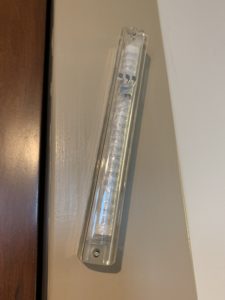Rosh Hashanah Mezuzzah Symbolizes New Beginnings
When I think of the High Holidays, many traditional symbols come to mind—
the sound of the shofar, an instrument made of a ram’s horn that signals the awakening of the Jewish people. The short and long blasts of the shofar—tekia, sh’varim, teruah, and tekia gedolah—summon us to come together and renew our relationship with each other, ourselves, and, of course Hashem. Crisp apples dipped in honey tempt our taste buds for a sweet new year, while we try a new fruit to symbolize gratefulness for being alive and allowing us to enjoy all the delicious fruit of the creator. A favorite fruit on this holiday is the pomegranate for its biblical significance—the Land of Israel is known for its pomegranates and is one of the “seven species†for its abundant seeds (613 to be exact) associated with fertility and good deeds, specifically the 613 mitzvot in the Torah. Here’s a good way to seed a pomegrante!
Challah is eaten all year round on Shabbat, but on the High Holidays the braided loaf is made into a round shape that represents the crown of a king for it was on Rosh Hashanah, the birthday of mankind, the sixth day of creation, that Hashem was coronated as King of the Jewish people. Another symbolic ritual during the 10 Days of Awe is tashlich, meaning “casting off†our sins of the previous year by tossing pieces of bread or another food into a natural body of flowing water. Beautiful melodic prayers such as the Armaic words of Kol Nidre, meaning “all vows,” and Avenu Malkenu, “Our Father Our King,” stir our emotions as we dig deep into our soul, asking and granting forgiveness of others and ourselves to release burdens we carry and start anew.
This year, for the first time, another Jewish symbol was added to the High Holidays for my family. The mezuzzah that we hung in my son’s new apartment on the Sunday before Rosh Hashanah. Continue reading
Pack The Traveler’s PrayerOn Your Next Trip
In Judaism, there is a prayer for everything, whether it’s finding lost luggage or helping someone find their perfect match, both of which I’ve done recently.
When we open our eyes in the morning, we thank God for the gift of a new day. Modeh ani. When we go to bed at night, we ask God to protect us while we sleep. The Sh’ma. And during the day and for every special occasion and holiday, we say prayers of gratitude that deepen our connection to God.
And when we travel, especially long distances, there is a prayer for that, too. Tefilat Haderech. And a new prayer that I just discovered for lost objects, Eloka d’Meir, aneini said three times followed up with tzedakah, which came in handy when the airport lost my husband’s luggage for three days while we were in Israel. When we finally picked up his roller duffle bag at a hotel in Tzvat, a different one that we were staying at, I said a big Baruch Hashem!


